Oct 15, 2024
🇮🇩 The new capital city of Nusantara
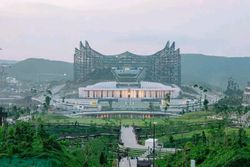
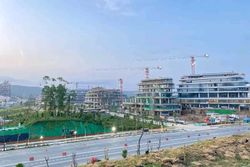
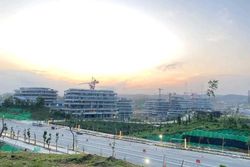
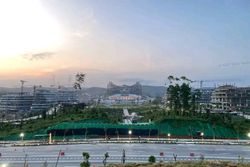
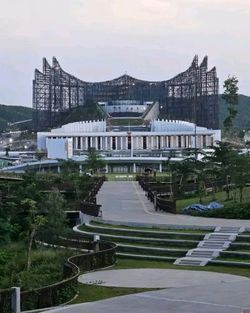
Indonesia’s New Jungle Capital Is a Work in Progress
President Joko Widodo wants to cement his legacy with a $29 billion megaproject to replace Jakarta.
Its fate is uncertain
More than 1,000 kilometers northeast of Indonesia’s capital, Jakarta, construction crews are carving a new administrative headquarters for the country out of the Borneo rainforest.
Nusantara, the planned city, is intended to be outgoing President Joko Widodo’s biggest legacy: a new center for the government, which will be free of the overcrowding and flooding that afflict Jakarta. The project, however, has failed to attract significant investment and has been plagued by construction delays.
In late July, Jokowi, as the Indonesian leader is known, began working from the presidential palace under construction in Nusantara. He set a goal of completing the palace so that Independence Day can be celebrated there on Saturday and the capital officially inaugurated. But he’s been forced to cut the guest list by more than 80% to 1,300 people due to logistical challenges. With a new president taking office in October, the fate of the entire megaproject is up in the air.
Two years after work began on Nusantara, city plans mapped onto satellite imagery from mid-July show the preliminary state of construction.
How Construction Has Progressed
More than 40 hectares (99 acres) of land to the east of the core government area consists of dirt and standing water. Some roads are still unpaved. When it rains, access routes to the palace are filled with mud. Weather constraints also prompted a delay in the planned opening of operations at Nusantara’s airport, which had been targeted for Independence Day.
The gradual transfer of more than 10,000 civil servants, planned first for March and then July, has been postponed again until September because their office and housing complexes aren’t ready — and may be delayed even further. Construction is complete at just one office building, meant to house four government agencies. Electricity and water, supplied through cables and pipes laid in underground tunnels, have begun to flow to some of the offices there. When civil servants do arrive, they may have to share rooms and work from temporary quarters, such as cafeterias.
Why Move the Capital?
Jokowi announced the relocation of the capital in 2019 to ease the pressure on Jakarta. Because Jakarta is sinking rapidly — at about 30.5 centimeters per year — experts predict that a third of the city will be underwater by 2050. About 40% of Jakarta is already below sea level. The city’s coastal areas are threatened by tidal floods that cause losses of more than 2 trillion rupiah ($128 million) annually. Polluted air is a daily reality for Jakarta’s 10 million inhabitants, as is stultifying traffic. Gridlock costs an estimated 100 trillion rupiah a year in lost productivity for the greater Jakarta area, known as Jabodetabek, encompassing 30 million people.
The site selected for the new capital is an area in East Kalimantan province on the island of Borneo, which Indonesia shares with Malaysia and the nation of Brunei. Some 1,400 kilometers (870 miles) northeast of Jakarta, the site is geographically in the middle of Indonesia and largely protected from the kinds of natural calamities (earthquakes, tsunamis and volcanic eruptions) that befall other islands in the archipelago. Construction began in 2022 after being stalled by the Covid-19 pandemic.
Nusantara Plan
Construction is in full swing around government core area but rest of the city is yet to be completed
Plans for a Modern Metropolis
The plan is to complete a part of the government core area by the end of this year. After that, the focus is on expanding basic infrastructure and offices with the aim of moving tens of thousands of civil servants to Nusantara by the end of 2029.
But that’s just the beginning of Jokowi’s very ambitious dream. His vision is to fill Nusantara with world-class educational institutions, modern hospitals and botanical gardens. With an environmentally friendly transportation system that uses only electric vehicles, he aims to have the city achieve net zero carbon emissions.
The whole plan is slated for completion by 2045. By then, the government estimates that 1.9 million people will live in Nusantara; many residents of Jakarta are expected to relocate there.
A Shortfall of Investor Interest
It’s expensive to build a new city from scratch. Nusantara’s price tag is about $29 billion, according to the official estimate. Jokowi’s idea is for financing to come from a mix of the government, state-owned enterprises, private companies and private-public partnerships, with the smallest burden falling on the state.
But so far, it hasn’t worked out that way. Since the groundbreaking, the state has spent nearly 72 trillion rupiah ($4.6 billion) on initial infrastructure development, close to the limit the government can spend, according to its official development plan. Despite various incentives offered by the government, such as tax breaks and long-term property rights, Nusantara has attracted less than 50 trillion rupiah in total investments, all of which came from local companies and state-owned institutions. Foreign companies are among the more than 400 that have signed letters of intent to invest, but none have yet made a binding commitment.
A Murky Future
President-elect Prabowo Subianto said on Monday that he is committed to continuing the project. But he is likely to face difficulties funding the new capital on top of his own campaign promises without breaking Indonesia’s budget. Prabowo has promised to provide free, nutritious meals to more than 80 million school children. It’s estimated the program will cost 450 trillion rupiah a year when it runs at full-scale.
Indonesian authorities point to the successful relocation of at least other 30 capitals in the past century, including Brasilia (Brazil), Astana (Kazakhstan) and Canberra (Australia). On the other hand, Naypyidaw, conceived by Myanmar’s previous junta, remains practically empty. While a new capital will typically host government buildings, it’s rare to see a large-scale uprooting of private business and the general population. In Egypt, about 1,500 families have so far moved to what’s called the New Administrative Capital, outside of Cairo; the target is 6.5 million residents.
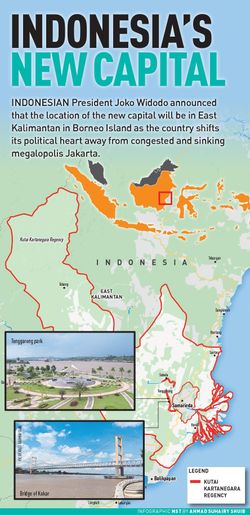
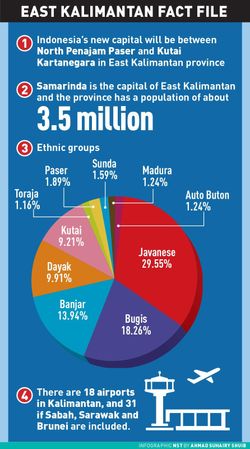
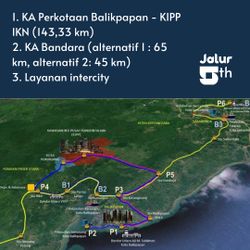
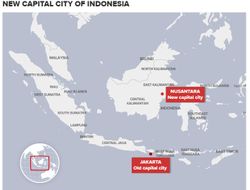
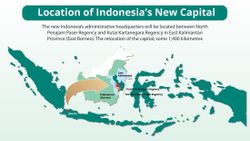
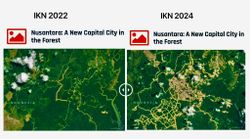
Prabowo Mentions Indonesian Govt is Forced to Move Its Capital City to IKN
TEMPO.CO, Jakarta - Indonesian President Prabowo Subianto stated that the impact of global climate change has led the government to decide to move the capital city from Jakarta to East Kalimantan. Prabowo highlighted the rising sea levels that have started to inundate some coastal areas in Indonesia.
"Indonesia is directly affected by climate change. Our coastal areas are now submerged by rising sea levels. We are forced to move our capital," said Prabowo in the third session of the G20 Summit, Rio de Janeiro, Brazil, on November 19, 2024, as quoted from a video by the Presidential Secretariat.
Prabowo cited that in North Java coast, sea levels rise five centimeters per year. He mentioned that Indonesia has also lost hundreds of thousands of hectares of productive land and usable land. Due to these circumstances, according to the former Minister of Defense, many farmers and fishermen are now living in difficult conditions. "This will worsen poverty and hunger," he said.
The third session of the G20 Summit themed "Sustainable Development and Energy Transition". Retired TNI General Prabowo emphasized the importance of global collaboration to address challenges of poverty, hunger, and climate change, as well as Sustainable Development Goals (SDGs) and green energy transition.
"We are committed to achieving renewable and green energy," said Prabowo.
The former Commander of the Army's Strategic Reserve Command mentioned that Indonesia has a big vision to achieve net zero emissions before 2050 through various efforts, such as increasing the use of biodiesel and converting Coal-Fired Power Plants (PLTU) to new renewable energy sources.
In the same speech, Prabowo announced that Indonesia will contribute US$30 million or around Rp 477 billion (at an exchange rate of Rp 15,900) to the World Health Organization (WHO). Indonesia supports the work of one of the United Nations agencies, said the former son-in-law of the 2nd President Soeharto. Prabowo invited G20 countries to continue making positive impacts on the world.
The Controversy of IKN and Prabowo's Commitment to Continue It
Nusantara, also known as the Capital City of Nusantara (IKN), was executed during the second term of the 7th President Joko Widodo's administration. Observers previously viewed IKN as a mega project that could burden the state budget. Environmental activists have also expressed concerns about the impacts of development and the potential displacement of land.
One criticism raised comes from Forest Watch Indonesia (FWI). FWI Campaign and Intervention Manager Anggi Putra Prayoga stated that the displacement of indigenous peoples occurred in the Core Area of the National Capital Region or IKN. "IKN displaces indigenous and local communities," Anggi told Tempo on Tuesday, August 20, 2024.
Anggi gave an example from Bukit Harapan Village, now the center of the IKN government, where residents can no longer stay there. They can't even build houses. "Their fields and rice fields are damaged. Yet, these are the sources of livelihood for the community," he said.
Coordinating Minister for Infrastructure and Regional Development Agus Harimurti Yudhoyono stated that President Prabowo Subianto directed the focus of development on the completion of the government center or political center. This target should be achieved within four years.
According to AHY, the Prabowo government will complete infrastructure development for the executive, legislative, and judicial branches. This development target is not just about building offices, but includes supporting housing facilities for civil servants (ASN).
"The target is that in the next four to five years, it can truly function as a new government center," said AHY at the Ministry of Public Works on Friday, November 8, 2024. "This is what President Prabowo hopes for."
The status of the state capital is still in Jakarta before President Prabowo signs the Capital City relocation regulation through a Presidential Decree or Keppres.
By undefined
13 notes ・ 2 views
English
Intermediate